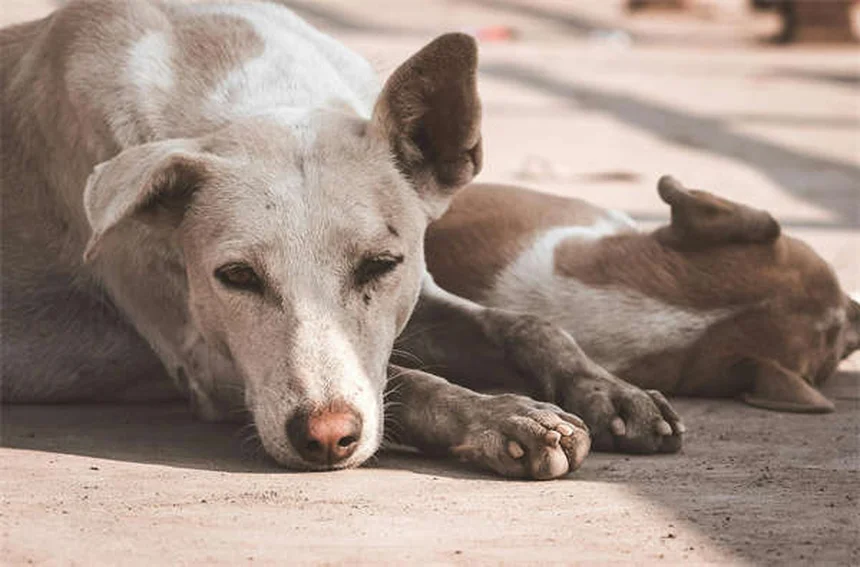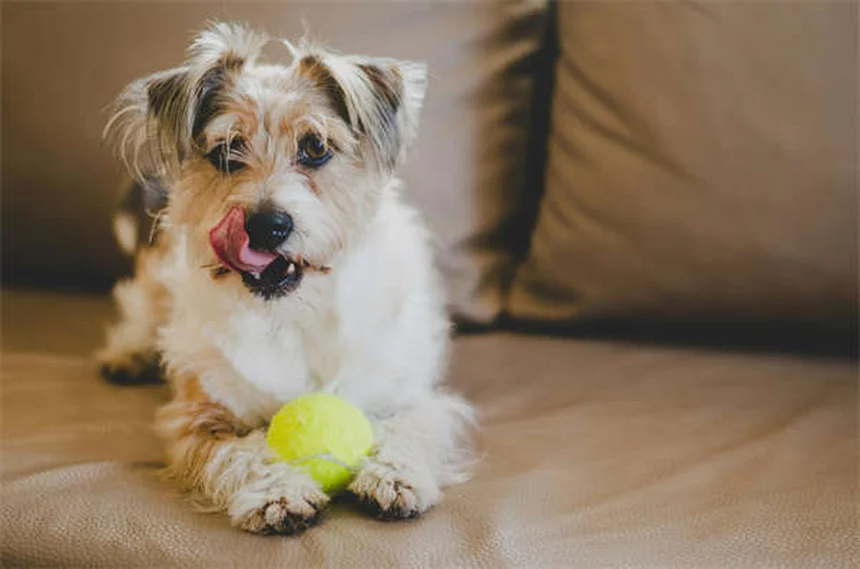Advertisement
Why is my dog's stomach making noises? The answer is: most stomach gurgles are completely normal! Those funny sounds (called borborygmi) usually just mean your pup's digestive system is working properly. We hear them most after meals or when our dogs are hungry - it's basically their stomach saying Hey, I'm doing my job here!But here's what you really want to know: when should those noises worry you? As a dog owner myself, I can tell you the red flags to watch for. If your dog's stomach sounds like a washing machine and they're vomiting, not eating, or acting lethargic, that's when it's time to call the vet. Otherwise, those gurgles are probably nothing to stress about. In this article, we'll break down exactly what causes those sounds and simple ways to help your pup feel better when their tummy's extra noisy.
E.g. :How to Remove a Tick from Your Dog Safely in 5 Easy Steps
- 1、Why Is My Dog's Stomach Making Those Funny Noises?
- 2、When Should You Actually Worry?
- 3、Simple Solutions for Noisy Tummies
- 4、Food Matters: What's In Their Bowl?
- 5、Stress: The Silent Gurgle Maker
- 6、When Home Care Isn't Enough
- 7、Prevention is the Best Medicine
- 8、The Science Behind Those Gurgles
- 9、Beyond the Basics: Lesser-Known Causes
- 10、Breed-Specific Considerations
- 11、Seasonal Factors You Might Not Expect
- 12、Age-Related Digestive Changes
- 13、The Emotional Side of Digestion
- 14、FAQs
Why Is My Dog's Stomach Making Those Funny Noises?
The Symphony of Digestion
Ever heard your dog's stomach sound like a bubbling cauldron? Those gurgles (called borborygmi in fancy vet terms) are usually just digestion doing its thing! When food and water move through your pup's digestive tract, the muscles contract in wave-like motions called peristalsis - and that's what creates the soundtrack to your dog's lunch.
Think of it like this: your dog's GI tract is basically a long tube from mouth to tail. When those muscles squeeze to push food along, you'll hear the natural sounds of digestion. This happens most noticeably right after meals - kind of like when your own stomach growls after smelling pizza!
Hunger Pangs or Something More?
Empty stomachs are noisy stomachs! Without food to muffle the sounds, gas and digestive juices sloshing around become much more noticeable. If it's been a few hours since Fido's last meal, those rumbles are probably just saying "Hey! Where's dinner?"
But here's something interesting - did you know dogs' stomachs can actually be louder than humans'? Their digestive systems work faster, processing food in about 4-6 hours compared to our 8-10. That's why you might hear more frequent gurgling from your canine companion!
When Should You Actually Worry?
 Photos provided by pixabay
Photos provided by pixabay
The Trouble Signs
While most stomach noises are harmless, certain symptoms paired with gurgling mean it's time to call the vet:
| Symptom | When to Worry |
|---|---|
| Vomiting | More than once in 24 hours |
| Diarrhea | Lasting over 24-48 hours |
| Lethargy | Not their usual playful self |
| Loss of appetite | Skipping more than one meal |
Here's a golden rule: If your dog's stomach sounds like a washing machine AND they're acting off, don't wait - make that vet appointment!
The "Oops I Ate That" Scenario
Ever caught your dog eyeing your socks like they're gourmet treats? When dogs eat non-food items (we're looking at you, tennis ball enthusiasts!), it can cause serious blockages. The increased gurgling you hear might be their body desperately trying to move something that shouldn't be there.
Fun fact: The ASPCA says socks are the #1 foreign object removed from dogs' stomachs. Who knew our laundry was so delicious?
Simple Solutions for Noisy Tummies
Hydration Station
Water is digestion's best friend! Keeping your pup well-hydrated helps everything move smoothly through their system. Try these pro tips:
- Add ice cubes to their bowl on hot days (dogs love crunching them!)
- Consider a pet water fountain - the running water encourages drinking
- Always have fresh water available, especially after exercise
 Photos provided by pixabay
Photos provided by pixabay
The Trouble Signs
Does your dog inhale food like a vacuum cleaner? Eating too fast means swallowing air, which leads to - you guessed it - more gurgles! Here's how to slow them down:
- Use a puzzle feeder or slow-feed bowl
- Spread kibble on a baking sheet
- Place a large clean rock in their bowl (they'll eat around it)
Did you know some dogs can eat a full meal in under 30 seconds? That's faster than most of us can say "slow down!"
Food Matters: What's In Their Bowl?
The Diet Connection
Ever notice your dog's stomach gets extra noisy after certain treats? Some ingredients are harder to digest than others. Common culprits include:
- Dairy products (most dogs are lactose intolerant)
- High-fiber veggies like beans or broccoli
- Fatty human foods
- Sudden diet changes
Here's a thought: What if your dog's food is the problem? Many commercial foods contain fillers that can cause digestive upset. Switching to a sensitive stomach formula might help - but always transition slowly over 7-10 days!
Portion Control is Key
Big meals = big noises! Smaller, more frequent meals can keep digestion running smoothly without the dramatic sound effects. Try splitting their daily food into 3-4 smaller portions instead of 2 large ones.
Pro tip: Use a measuring cup - those "scoops" can vary wildly in size! Your dog might be getting way more (or less) than you think.
Stress: The Silent Gurgle Maker
 Photos provided by pixabay
Photos provided by pixabay
The Trouble Signs
Did you know stressed dogs swallow more air? Panting from anxiety leads to extra gas, which means - yep - more stomach noises. Common stress triggers include:
- Thunderstorms or fireworks
- Vet visits
- New pets or people in the home
- Changes in routine
Try calming solutions like pheromone diffusers or anxiety wraps. For some dogs, just having a quiet "safe space" can make a world of difference!
The Gut-Brain Connection
Here's something fascinating: your dog's gut health affects their mood, and vice versa! An unbalanced gut microbiome can actually make anxiety worse. That's why many calming supplements now include probiotics.
Consider this: Would you believe some studies show that certain probiotics can be as effective as anti-anxiety meds for dogs? Nature's pretty amazing!
When Home Care Isn't Enough
Time for Professional Help
If you've tried everything and your dog's stomach still sounds like a dubstep track, it might be time for vet intervention. Persistent gurgling could signal:
- Parasites
- Food allergies
- Inflammatory bowel disease
- Pancreatic issues
Remember: You know your dog best. If something feels off, trust your gut (even if your dog's gut is the one making noise)!
The Diagnostic Process
Wondering what to expect at the vet? Typical tests might include:
- Fecal exam (checking for parasites)
- Blood work
- Ultrasound
- Sometimes even X-rays
The good news? Most cases of noisy stomachs are easily treated once the cause is found. Your vet might recommend probiotics, diet changes, or medication depending on the diagnosis.
Prevention is the Best Medicine
Daily Habits for Happy Tummies
Keeping your dog's digestion running smoothly is easier than you think! Try these daily habits:
- Consistent feeding schedule
- Regular exercise (but not right after meals)
- Limited treats (stick to 10% of daily calories)
- Slow introduction of new foods
Fun fact: Dogs who eat at the same times every day actually have more predictable digestion. Their bodies get into a rhythm!
The Probiotic Advantage
Adding probiotics to your dog's routine can work wonders for digestive health. Look for products containing:
- Lactobacillus
- Bifidobacterium
- Enterococcus
Did you know some yogurts contain probiotics safe for dogs? Just make sure they're plain and unsweetened - and check with your vet first!
The Science Behind Those Gurgles
What's Really Happening Inside?
You know those funny noises your dog's stomach makes? Let me tell you, it's like a full-on science experiment in there! The digestive system is basically a chemical processing plant, breaking down food into nutrients while producing gas as a byproduct. When these gases move through the intestines, they create those signature gurgles we all recognize.
Here's something cool - dogs have a shorter digestive tract than humans, which means food moves through faster. That's why you might hear more frequent noises compared to your own stomach. The average canine digestive process takes about 4-6 hours, while ours can take up to 24 hours for complete digestion!
The Microbiome Connection
Did you know your dog's gut is home to trillions of bacteria? This microbiome plays a huge role in digestion, immunity, and even behavior. When the balance gets thrown off - maybe from stress or diet changes - that's when the real symphony begins!
Think of it like a city where all the bacteria are workers. If some departments get understaffed (like the good bacteria), the whole system gets noisy trying to compensate. That's why probiotics can be so helpful - they're like sending in reinforcements for your dog's digestive workforce!
Beyond the Basics: Lesser-Known Causes
Temperature Troubles
Ever notice your dog's stomach gets extra noisy after drinking cold water? Temperature shocks to the system can cause temporary digestive disturbances. I've seen dogs gulp down ice water after playing outside, only to sound like a bubbling volcano minutes later!
Here's a pro tip: Try room temperature water instead, especially after exercise. And if you're using ice cubes as treats, let them lick rather than crunch to prevent that sudden temperature change.
The Exercise Equation
You might not realize this, but activity level affects digestion more than we think. Too much exercise right after eating can lead to increased stomach noises and even discomfort. Remember when your mom told you not to swim right after lunch? Same principle applies to our furry friends!
Check out this helpful guideline:
| Activity | Recommended Wait Time After Eating |
|---|---|
| Light Walk | 30 minutes |
| Vigorous Play | 1-2 hours |
| Swimming | 2+ hours |
Ever wonder why dogs often nap after meals? Their bodies are smart - they know to rest while digestion does its work!
Breed-Specific Considerations
Deep-Chested Dogs and Digestion
If you've got a Great Dane or other deep-chested breed, listen up! These guys are more prone to digestive issues because of their body structure. The extra space in their chest cavity means more room for stomach movement - and more potential for noisy digestion.
Here's something I learned from a vet friend: Elevated feeders can actually help these breeds digest better by improving their posture during meals. Just make sure it's at the right height - about elbow level when standing.
Small Breed Sensitivities
Little dogs might have tiny tummies, but they can make some big noises! Their faster metabolisms mean food moves through quickly, often resulting in more frequent gurgling. Plus, many small breeds are prone to dental issues that can affect how well they chew their food.
Have you noticed your Chihuahua making more noise than your neighbor's Labrador? That's completely normal! Smaller dogs often benefit from more frequent, smaller meals to keep their digestion steady throughout the day.
Seasonal Factors You Might Not Expect
Summer Stomachs
Hot weather does weird things to digestion - for both humans and dogs! Dehydration slows everything down, while increased panting introduces more air into the system. I've seen perfectly healthy dogs develop noisy stomachs just from a heat wave!
Here's a summer survival tip: Add water to your dog's kibble or offer ice cube treats to keep hydration up. And remember - if you're thirsty, your dog probably is too!
Winter Woes
Cold weather brings its own digestive challenges. Less outdoor activity means slower digestion, while holiday treats and table scraps can upset sensitive stomachs. Many dogs actually experience more digestive noise during the winter months!
Ever notice your dog's stomach sounds change with the seasons? That's their body adjusting to temperature changes and activity patterns. Maintaining a consistent routine helps minimize these seasonal fluctuations.
Age-Related Digestive Changes
Puppy Power Digestion
Baby dogs have baby digestive systems that are still developing! Puppy stomachs are extra sensitive as they learn to process different foods. That's why you'll often hear more gurgling from puppies - their gut bacteria is still establishing itself.
Did you know puppies need to eat more frequently than adult dogs? Their tiny stomachs can't hold much, so they need 3-4 small meals a day. All that eating means plenty of digestive action - and plenty of noise!
Senior Dog Considerations
As dogs age, their digestion naturally slows down. Less efficient digestion means more gas production and potentially louder stomach sounds. Many older dogs also develop food sensitivities they didn't have in their youth.
Here's something important: If your senior dog's stomach noises suddenly change pattern or intensity, it's worth mentioning to your vet. While some changes are normal with age, others might signal health issues needing attention.
The Emotional Side of Digestion
Excitement-Induced Gurgles
Ever notice your dog's stomach gets noisy when you grab the leash? Emotional arousal affects digestion in surprising ways. The anticipation of a walk or car ride can actually stimulate digestive activity before food even enters the picture!
I've seen dogs start making stomach noises the moment their owner puts on shoes. It's like their whole body gets ready for action - digestive system included!
The Comfort Food Effect
Dogs can develop emotional attachments to certain foods just like we do. Familiar, comforting meals often digest more quietly than new or stressful eating experiences. That's why many dogs have calmer digestion when sticking to a consistent diet.
Think about it - don't you digest your favorite childhood foods better than exotic new dishes? Our furry friends experience the same phenomenon!
E.g. :Why Is My Dog's Stomach Gurgling? | PetMD
FAQs
Q: Is it normal for my dog's stomach to make loud gurgling sounds?
A: Absolutely! Those stomach noises (called borborygmi) are usually just part of normal digestion. Think of it like plumbing - when food and water move through your dog's digestive tract, you'll naturally hear some sounds. We notice it most right after meals or when their stomach is empty. My own Labrador's stomach sounds like a bubbling cauldron sometimes, especially when he's hungry! The key is watching for other symptoms. If your dog is acting normal - eating, playing, and pooping regularly - those noises are probably nothing to worry about.
Q: What foods cause excessive stomach gurgling in dogs?
A: Dairy products, fatty foods, and sudden diet changes are the biggest culprits for noisy dog stomachs. Many dogs are lactose intolerant, so that "pup cup" from the coffee shop might lead to a symphony of gurgles later! High-fiber veggies like broccoli or beans can also cause extra noise. Here's a pro tip from my vet: if you're switching foods, do it gradually over 7-10 days to avoid digestive upset. I learned this the hard way when I quickly changed my dog's food and his stomach sounded like a thunderstorm for days!
Q: How can I tell if my dog's stomach noises are serious?
A: Watch for these red flags along with the gurgling: vomiting more than once in 24 hours, diarrhea lasting over a day, loss of appetite, or unusual lethargy. If your dog seems painful (hunched posture, whining when touched), that's another warning sign. Here's my personal rule: if the noises sound dramatically different than usual AND my dog isn't acting like himself, I call the vet. Better safe than sorry when it comes to our furry friends!
Q: Can stress cause my dog's stomach to make noises?
A: Yes! Stress is a surprisingly common cause of noisy dog stomachs. When dogs get anxious (from thunderstorms, vet visits, etc.), they often pant and swallow air, which leads to extra gas and gurgling. I've noticed my dog's stomach gets extra noisy during fireworks season. The gut-brain connection is real in dogs too! Calming solutions like pheromone diffusers or anxiety wraps can help. Some vets even recommend probiotic supplements that support both digestion and relaxation.
Q: What home remedies help quiet a dog's gurgling stomach?
A: Try these simple solutions that work for my own dog: 1) Offer small amounts of plain, boiled chicken and rice, 2) Use a slow-feed bowl to prevent air swallowing, 3) Keep fresh water available at all times, and 4) Give smaller, more frequent meals. Pumpkin puree (not pie filling!) can also help soothe upset stomachs. Just remember - if home remedies don't help within 24 hours, or if your dog seems uncomfortable, it's time to consult your vet. I always keep some canned pumpkin in my pantry just for these situations!























